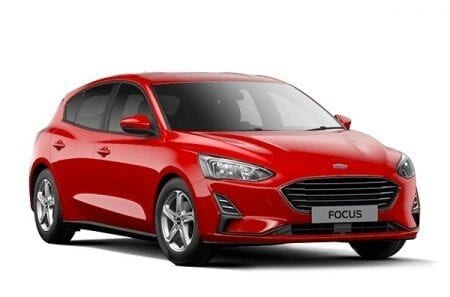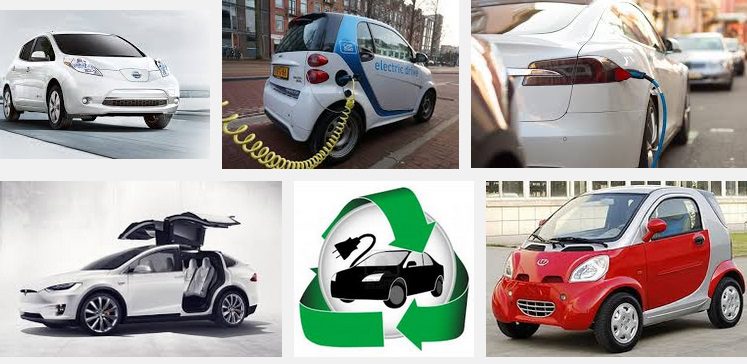
Should you buy an electric car with a surcharge? We believe: electric versus hybrid versus gasoline option
Content
- Electric vehicle, hybrid and internal combustion vehicle - the profitability of the purchase
- Electric vehicle, hybrid and combustion vehicle operating costs [option 1]
- Operating cost of an electric vehicle versus a hybrid and an internal combustion engine [option 2]
- The cost of using an electric vehicle versus a hybrid and an internal combustion vehicle [option 3]
- Summary: is it worth buying an electric car for a surcharge?
Should you buy an electric car to save money? What if we want to reduce operating costs: an electric vehicle, an internal combustion car with a small electric motor (hybrid), or maybe a conventional combustion model? Which car will be the cheapest?
Electric vehicle, hybrid and internal combustion vehicle - the profitability of the purchase
Before moving on to the description of the calculations, let's get acquainted with the machines that we have selected for comparison. These are the models from segment B:
- Electric Peugeot e-208 “Active” for PLN 124, surcharge PLN 900,
- petrol Peugeot 208 "Active" for PLN 58,
- gasoline Toyota Yaris Hybrid “Active” for PLN 65 (source).
In all three cars, we chose the lowest-priced variants, and only in the Peugeot 208 did we allow ourselves a little extravagance to make the cabin equipment identical to that of an electric car and very similar to the Toyota Yaris Hybrid.
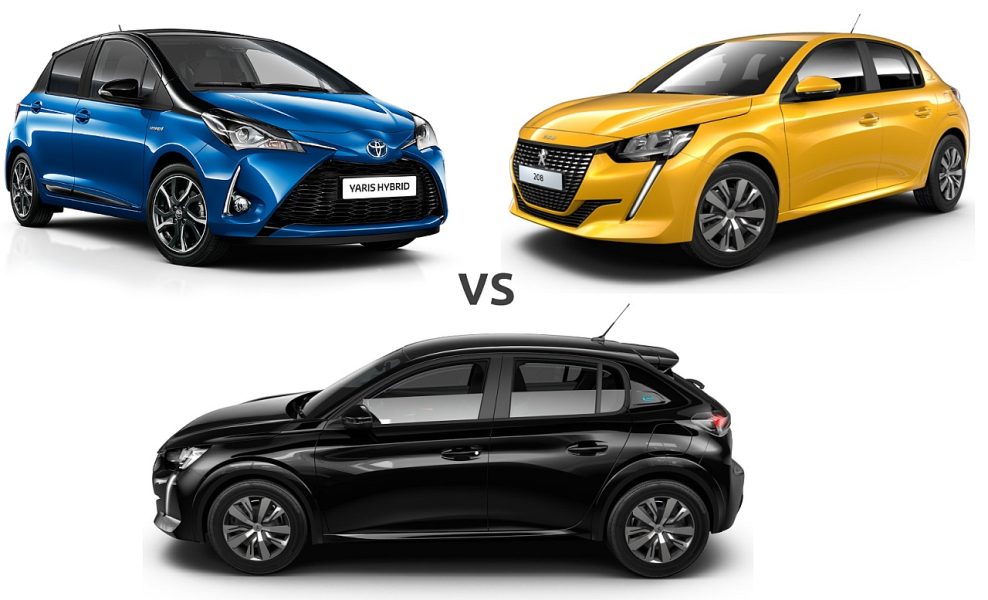
We assumed that Peugeot e-208 consumes 13,8 kWh / 100 km, as this value corresponds to the declared WLTP range (340 km). In our opinion, this is an underestimate - the WLTP values are lower than the real ones - but we used it because the other two models also use the WLTP standard:
- Peugeot 208 – 5,4 l / 100 km,
- Toyota Yaris Hybrid: 4,7-5 l / 100 km, we assumed 4,85 l / 100 km.
We also assumed that petrol costs PLN 4,92 per liter, and the warranty service, performed once a year, is PLN 600 for internal combustion and internal combustion vehicles. 2/3 of this value for an electrician:
> Is it more expensive to inspect electric vehicles than combustion vehicles? Peugeot: 1/3 cheaper
In the gasoline Peugeot 208, we took into account the wear and replacement of brake pads and discs after 5 years. In an electric car and a hybrid, it was not needed. Examined the 8-year horizonAfter all, the warranty on the Peugeot e-208 battery is valid for only 8 years or 160 thousand kilometers.
We did not take into account any additional costs in the category of replacing the cabin air filter or replacing the stabilizer links, because they are probably the same in all cars.
The rest of the values change depending on the characteristics of use. Here are our options:
Electric vehicle, hybrid and combustion vehicle operating costs [option 1]
According to the Central Statistical Office of Poland for 2015, Poles traveled an average of 12,1 thousand kilometers per year. This is 1008 kilometers per month. With such a not very intense operation Gasoline Peugeot 208 was the cheapest to buy and service.
The second was the Toyota Yaris Hybrid.at the very end, the electric Peugeot e-208 appeared. As you can see, the difference in combustion between the hybrid and conventional combustion models is so small that money spent on a hybrid practically does not pay off.
If you charge an electric car from a socket in the G11 tariff, you will have PLN 160-190 per month in your wallet. When we drive for short distances - a cold engine of an internal combustion car; there is no such problem in the electrician - the savings will be higher:
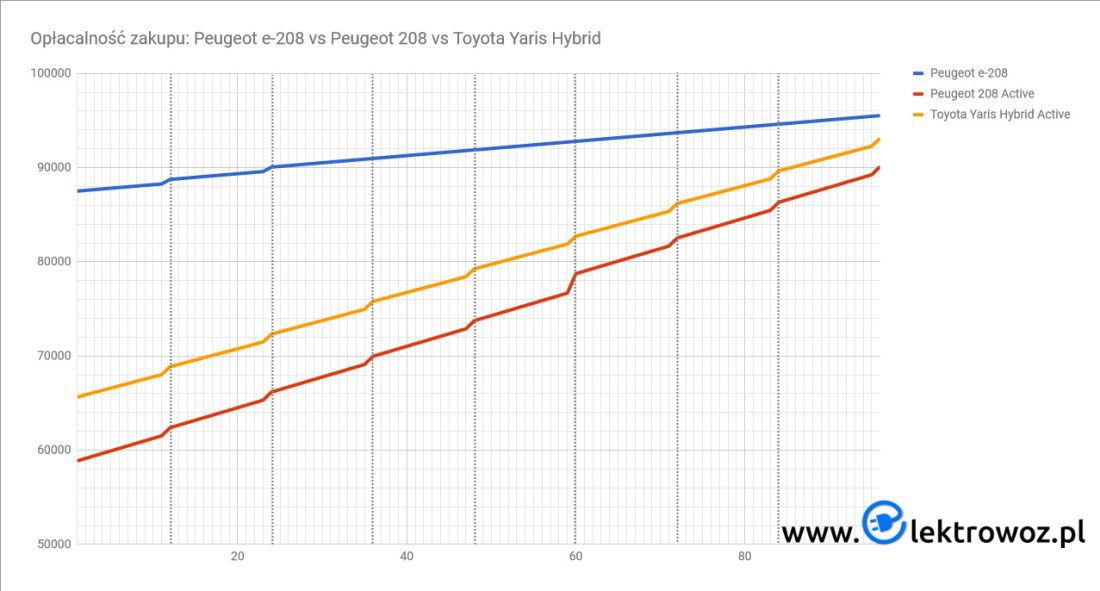
Why do internal combustion vehicles have clear “rungs” every year, and yet no electrician? Well, we assumed that the owner undergoes mandatory inspections during the warranty period, and then refuses them so as not to incur costs. In turn, the oil in an internal combustion car needs to be changed every year, whether we like it or not.
As already mentioned, tariffication according to the G11 tariff is assumed in the calculations. Hardly anyone (no?) The owner of an electric car uses it, but we noticed that people without an electrician use tariffs from the G11 tariff and think accordingly.
Now let's try to make the data a little real:
Operating cost of an electric vehicle versus a hybrid and an internal combustion engine [option 2]
According to the Central Statistical Office, the more willing people are to drive, the cheaper the fuel is. Diesel and LPG vehicles travel significantly longer annual distances than gasoline vehicles. On average, it was over 15 kilometers per year. So let's try to change the above estimates and assume that:
- all described vehicles drive 15 kilometers per year,
- The electric driver uses the G12AS anti-smog tariff and charges at night.
In such a situation, after 8 years, the gasoline Peugeot 208 is still the cheapest car to operate. In second place is the electric Peugeot e-208., which beats the third-place Toyota Yaris Hybrid by a wide margin. The electrician wins a little over the hybrid, but its owners will be very pleased with it when used - monthly fee for payments less than 50 PLN (!), which means savings of at least 190-220 PLN month after month.:
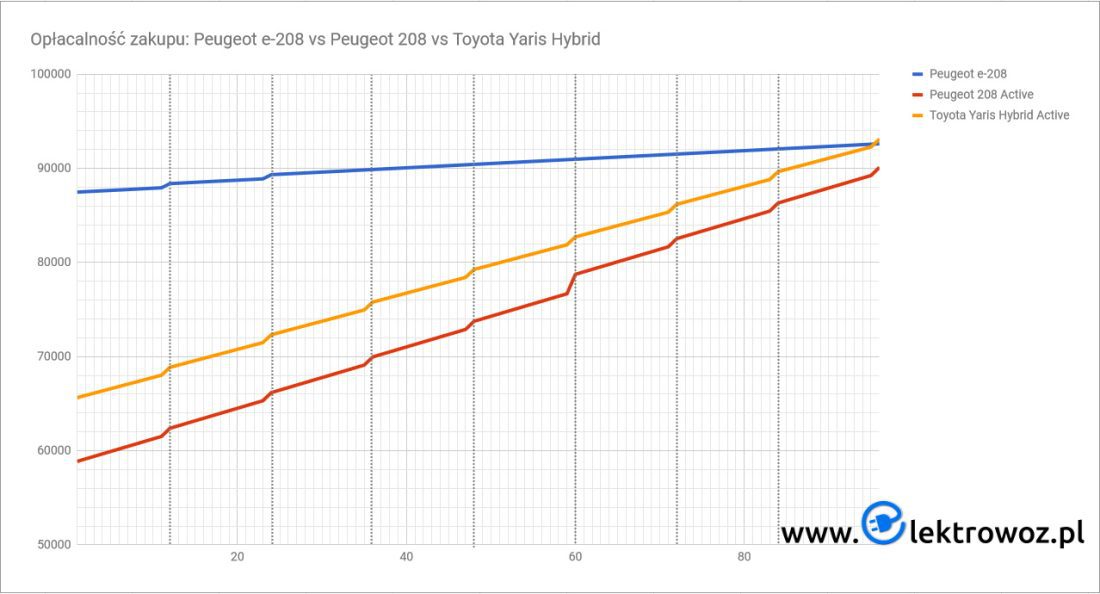
Internal combustion machines, also a hybrid, falls into the category cry and pay: the more we drive, the more expensive our fuel is... Meanwhile, electric vehicles have a very nice feature, namely: large space for optimization... They allow us to use free energy, for example, offered in a parking lot or in a store.
Let's check what the situation would look like if we used it:
The cost of using an electric vehicle versus a hybrid and an internal combustion vehicle [option 3]
Suppose we still drive these 15 kilometers a year, but electricity free, that is, for example, from photovoltaic panels on the roof or from a charging station at Ikea. In such a situation, the yield graph looks like this:
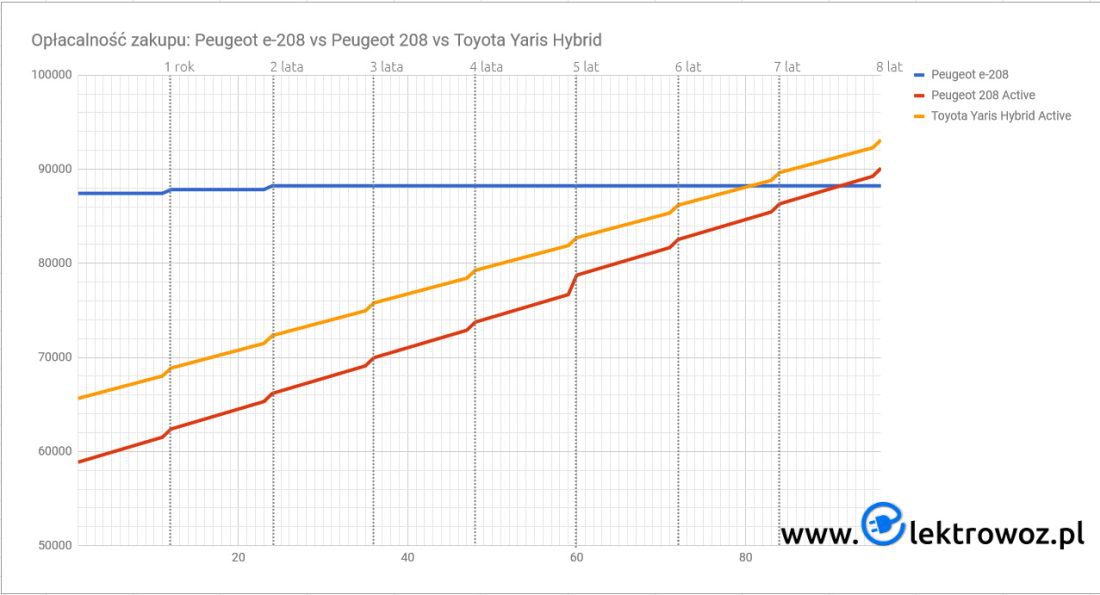
A hybrid loses its meaning after more than 6 years, a petrol car with a small engine after more than 7 years. And all this while maintaining the relatively low price of gasoline, which now stands at PLN 4,92 per liter.
Summary: is it worth buying an electric car for a surcharge?
If we are thinking about buying an electric car, we drive a little and only the table is important to us, we may have trouble making a decision. Then it’s worth considering that a pure electric – as opposed to an internal combustion vehicle or a hybrid – has additional benefits:
- parks in cities for free,
- passes through bus lanes, allowing essential saving time,
- its operating costs can be significantly optimized (reduced).
> Cybertruck already ordered over 350 times? Tesla Changes Delivery Times, Dual and Tri Versions First
The more kilometers we travel in a year, the less time we need to think about. Additional arguments for an electrician:
- dynamics - Peugeot e-208 acceleration to 100 km / h takes 8,1 seconds, for internal combustion vehicles - 12-13 seconds!
- the possibility of remote heating of the passenger compartment in winter, without waiting for the "engine warm-up",
- lower energy consumption in the city - for internal combustion vehicles, the opposite is true, only hybrids partially solve this problem,
- more comfortable operation - there is no dirt and foreign liquids under the hood, no need to change gears.
In our opinion, buying an electrician is the better, the more we love cheap and dynamic driving. The purchase of an internal combustion vehicle today involves significant resale losses.because the Polish market will begin to flood with new and used petrol models that no one wants anymore.
> The price of Renault Zoe ZE 50 “Zen” has been reduced to PLN 124. With a surcharge, 900 PLN will be issued!
This may interest you:
